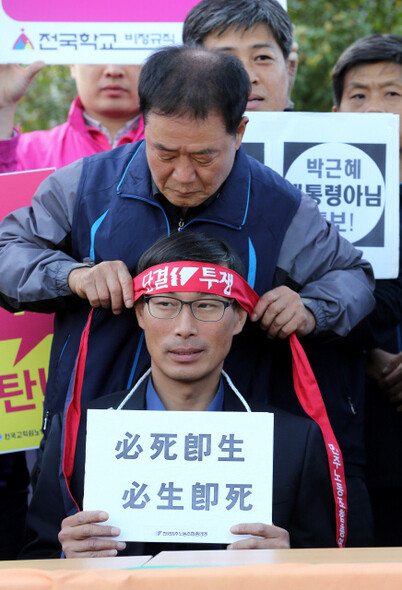
By Lee Jung-ggok and Im In-tack, staff reporters
The Korean Teachers’ and Education Workers’ Union (KTU) received official notice from the Ministry of Employment and Labor on Oct. 24 informing them that the union’s legal status was being revoked. Fourteen years after it gained legal union status in 1999, the nation’s elementary, middle, and high school teachers are now out on the street without their constitutionally guaranteed right to organize.
All of this occurred because of nine teachers who remained members after losing their jobs.
The union’s new status as an unrecognized union doesn’t only mean that its 60,000 members are now part of an illegal labor group. With evidence of illegal interference in last year’s presidential election by the National Intelligence Service and the military, the handling of the case suggests that a defensive Park Geun-hye administration is trying to turn things around for itself by creating a new battlefront with the KTU. Some have even suggested that it is declaring its bridges with the labor community officially burned, with the banning of the already legalized KTU coming after the Korean Government Employees’ Union was turned away from the threshold of legalization last month.
Others have said the move adds momentum to attempts to turn back the historical clock, as witnessed with the recent approval of a New Right history textbook that touched off a furor with its whitewashing of South Korea’s history of dictatorship and collaboration with Japanese occupiers.
To begin with, the Ministry of Employment and Labor’s actions show just how opposed the Park administration is to the labor community, and how committed it is to quashing its political opponents.
Chung-Ang University sociology professor Lee Byung-hoon has argued that for all the ministry’s claims of a legal basis in revoking the KTU’s status, the actual logic was political.
“Labor unions are an area of public security,” Lee said. “In the labor world, we’re seeing how the Park Geun-hye administration will quash you ruthlessly if you’re not on its side. We see it in the refusal to approve the government workers’ union and the notice revoking the KTU’s legal status: they are consistently refusing to recognize those segments they have deemed different from them.”
The same factors explain the dire pronouncements of Catholic University of Korea professor Cho Don-mun. “The Park Geun-hye administration is doing things even the [preceding] Lee Myung-bak administration didn’t do,” Cho said. “It feels like we’ve gone back to the days of Park Chung-hee and the military dictatorship. The revocation of the KTU’s legal status is a barometer showing the administration’s policies for killing democratic unions.”
Other observers have suggested that the administration is undertaking an “ideological project” to engineer a rightward shift in South Korean society by undermining one of the pillars of the progressive movement. The textbook episode factors into the story here, since the KTU was the single fiercest opponent to the effort to distribute textbooks glorifying the Rhee Syngman and Park Chung-hee regimes in the country’s classrooms.
“There is an aspect of attempting to stifle the KTU because they’ve been critical of the distortions of history in these textbooks,” said Cho Don-mun.
Indeed, the KTU has made campaigning for the removal of New Right textbooks and opposition to their adoption into one of its key battles going ahead.
With the Park administration committing to policies that oppose the labor community, some analysts are predicting it will encounter hurdles executing policies in other areas, including the economy and employment. The expansion of part-time employment to achieve a 70% employment rate requires the consent of the labor community, but experts are warning that any willingness to cooperate may now be damaged beyond repair.
“A 70% employment rate can only be achieved through close cooperation between labor and management,” said Lee Ho-geun, a law professor at Chonbuk National University. “If the administration rejects fundamental things like the internationally and constitutionally guaranteed right of workers to organize, then it’s going to get a lot harder to achieve a social consensus.”
Lee Byung-hoon agreed, saying the administration was “hamstringing itself.”
Until the state decides to stop turning the public into its enemy, the idea of popular unity appears likely to remain a distant dream.
Please direct questions or comments to [english@hani.co.kr]